"Useless" French Words You Learned in School (And What to Say Instead)
Still saying "Comme ci, comme ça"? You might sound like a textbook. Discover 5 outdated French phrases to drop and the modern alternatives natives actually use.
Simply French Team
Have you ever proudly used a French phrase you mastered in high school, only to have a native speaker look at you with confusion—or worse, amusement?
You aren't alone.
A recent discussion on Reddit’s r/French community highlighted a common struggle for learners: the disconnect between academic French and the French actually spoken on the streets of Paris today.
It started when a French tutor noticed a student repeatedly using the phrase "Comme ci, comme ça." The tutor realized they hadn't heard that phrase in years, calling it "old-fashioned" and a hallmark of "French class specials."
If you want to stop sounding like a textbook from the 1990s and start sounding like a local, it’s time to retire these 5 outdated phrases and update your vocabulary.
1. The Classic: "Comme ci, comme ça"
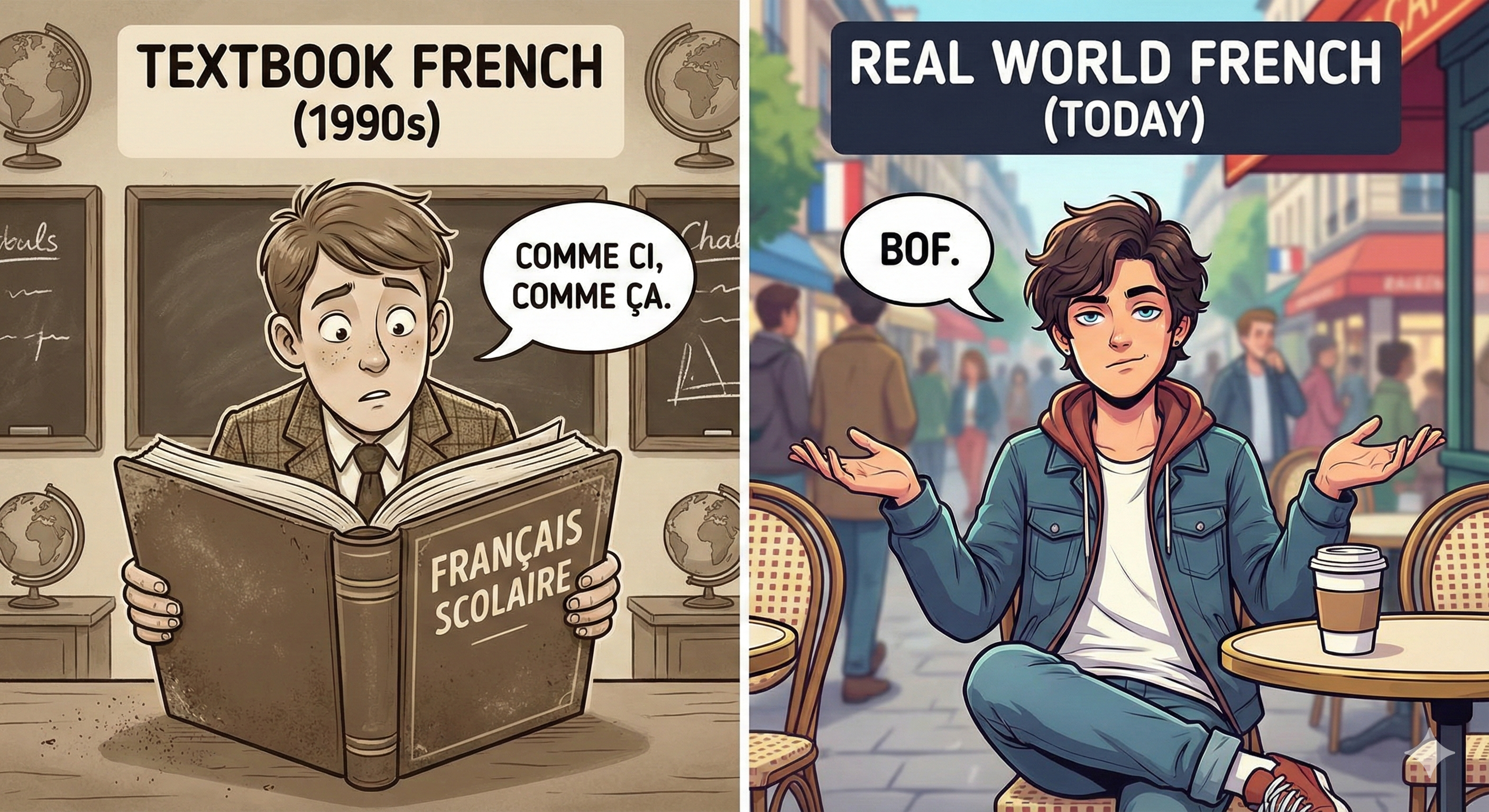
(The So-So Trap)
This is the phrase that sparked the debate. In almost every beginner textbook, when someone asks "Ça va ?" (How are you?), the suggested middle-ground answer is "Comme ci, comme ça" (So-so).
Why you should drop it:
While not grammatically incorrect, native speakers rarely use it anymore. It sounds cliché, slightly childish, and immediately flags you as a foreigner who learned French exclusively in a classroom setting.
What to say instead:
If you are feeling average or just okay, try these natural alternatives:
- "Bof" (accompanied by a shrug) – The ultimate French expression of indifference.
- "Ça va" – Yes, you can answer the question with the question. "Ça va ?" -> "Ça va."
- "Pas mal" – Not bad.
- "Ça se tire" – (Slang) It’s going / I’m getting by.
2. The Formal Trap: "Nous" (In casual conversation)
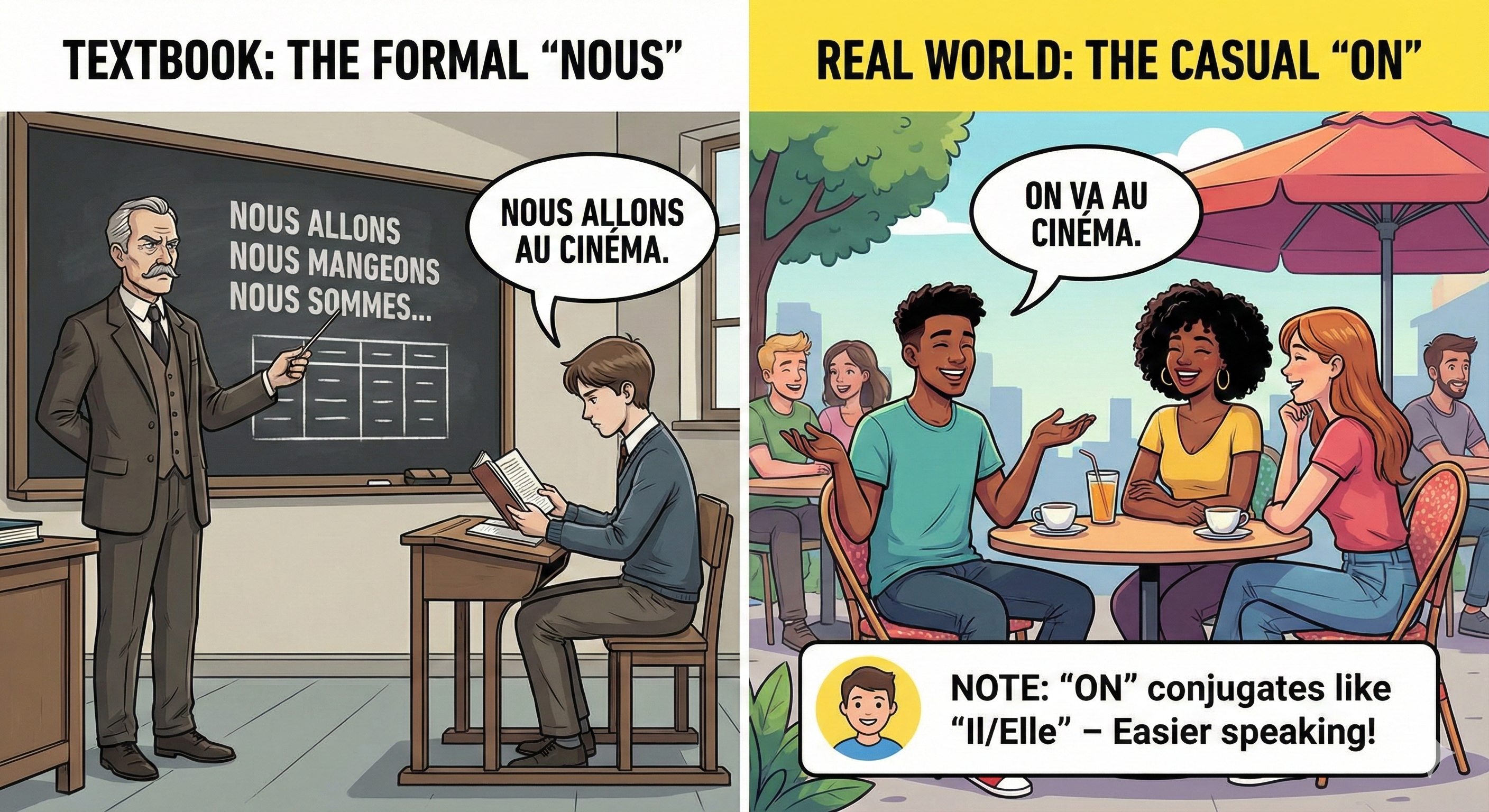
(The We Problem)
You spent weeks memorizing verb conjugation charts for Nous (We). Nous allons, nous mangeons, nous sommes...
Why you should drop it:
In modern spoken French, Nous is almost exclusively reserved for formal writing, speeches, or very formal contexts. Using it in casual conversation makes you sound stiff and robotic.
What to say instead:
Use "On".
- Textbook: "Nous allons au cinéma."
- Real World: "On va au cinéma."
Note: "On" conjugates like "Il/Elle," which actually makes speaking easier!
3. The Tourist Trap: "Sacré bleu !"
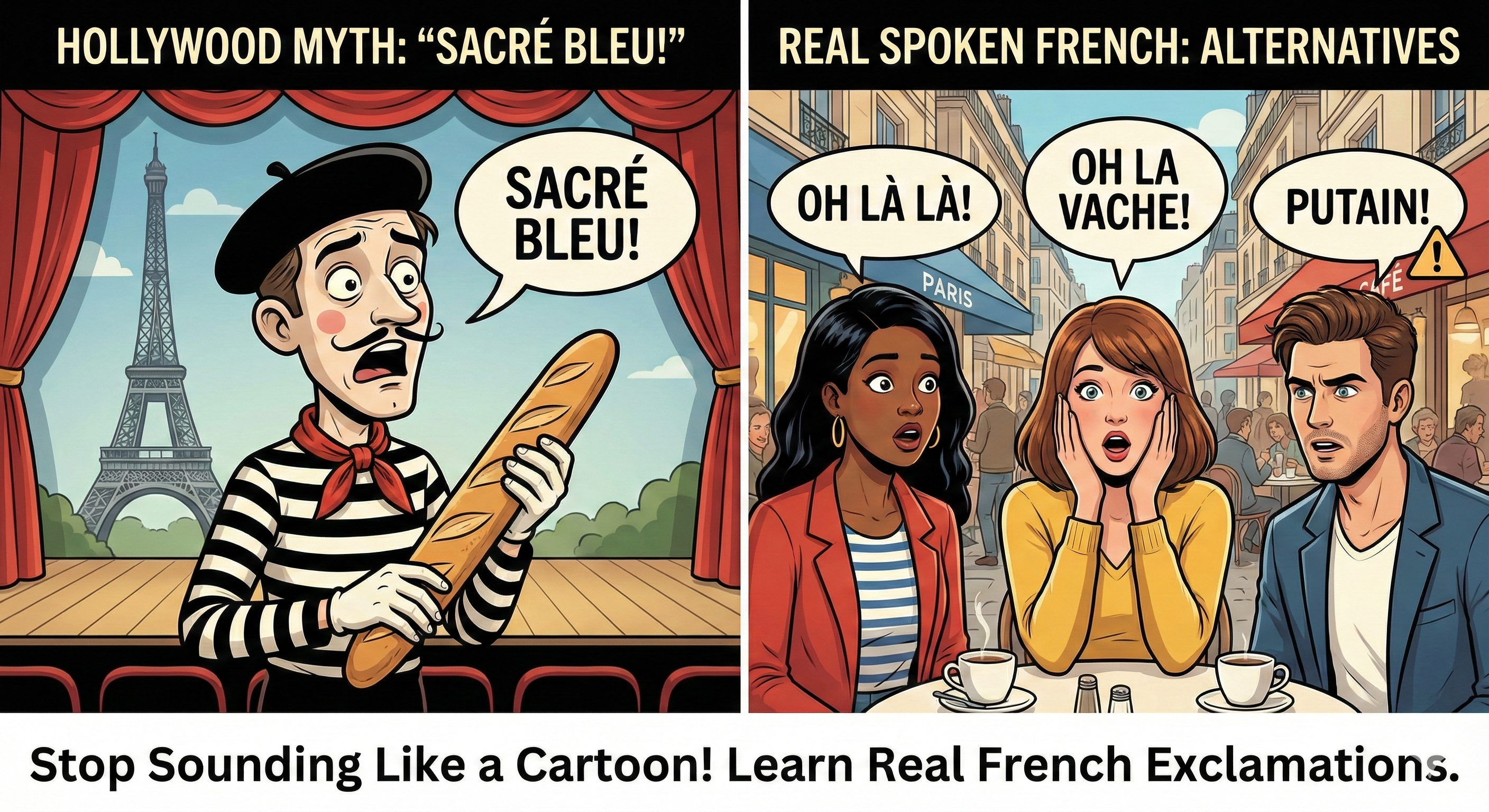
(The Hollywood Myth)
Thanks to American cartoons and movies, many people believe French people walk around shouting "Sacré bleu !" whenever they are surprised.
Why you should drop it:
No one has said this seriously in about a century. If you say it, people will think you are making a joke.
What to say instead:
French has a wide variety of exclamations for surprise. Depending on the company you are in:
- "Oh là là !" (Yes, this is actually used, usually to express disaster or being overwhelmed).
- "Vache !" or "Oh la vache !" (Holy cow).
- "Putain !" (The famous swear word—use with caution, but it is the most common reality).
4. The Politeness Trap: "Puis-je... ?"
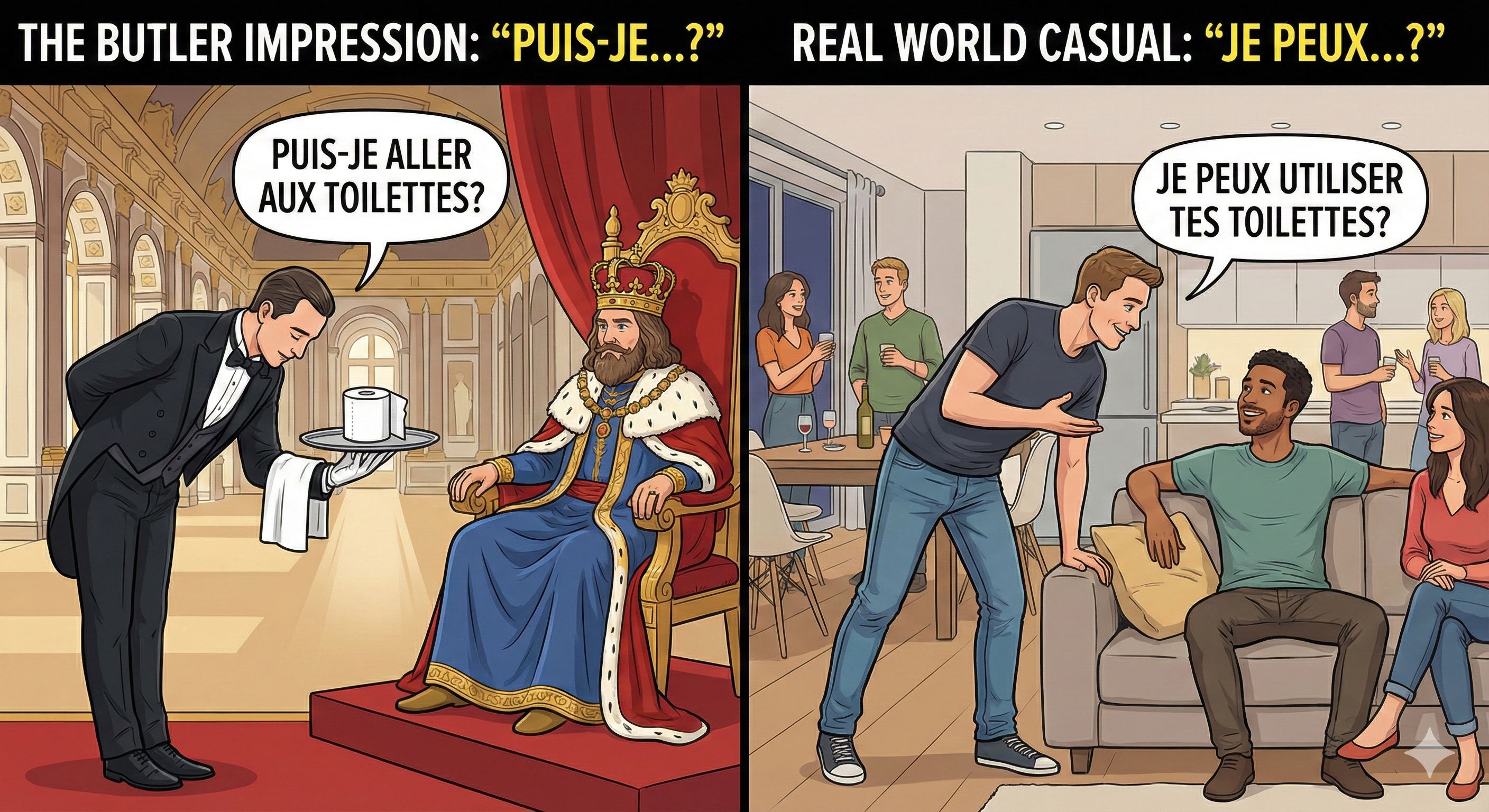
(The Butler Impression)
You might have learned to ask "Puis-je aller aux toilettes ?" (May I go to the bathroom?) in school.
Why you should drop it:
Inversion (switching the verb and subject) is already formal. Using "Puis-je" (Can I) is extremely elevated. You sound like you are addressing the King of France or acting in a period drama.
What to say instead:
- "Est-ce que je peux..." (Standard/Polite).
- "Je peux..." (Casual, with rising intonation).
- Example: "Je peux utiliser tes toilettes ?"
5. The Greeting Trap: "Enchanté" (Overused)
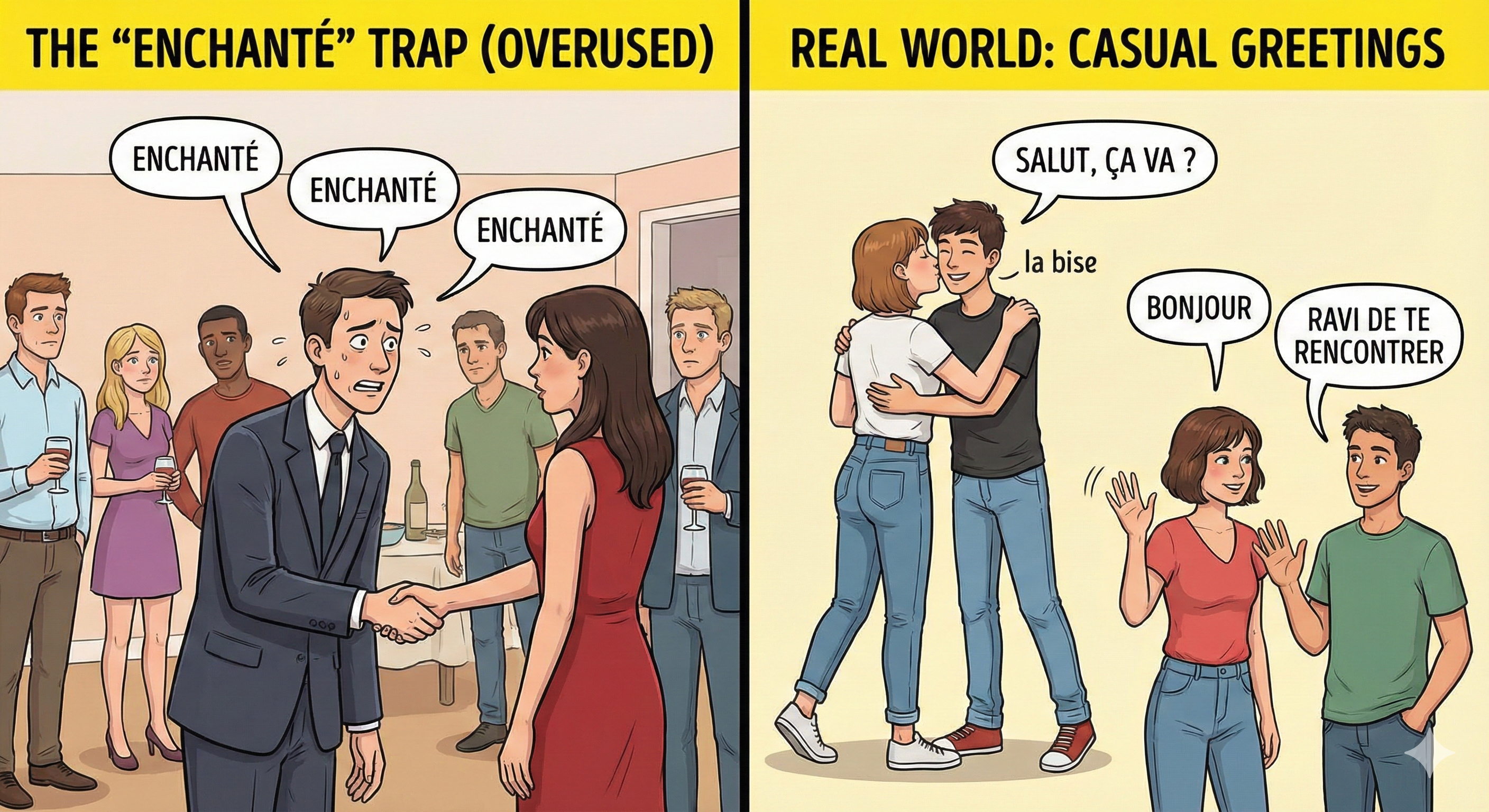
(The Nice to Meet You)
Why you should drop it:
This isn't "useless," but it is often overused by learners. Enchanté is polite, but in very casual settings among young people, it can sometimes feel a bit too formal or stiff if you say it to everyone at a party.
What to say instead:
Often, a simple "Bonjour" or "Salut" with a nod or a handshake/bise is enough.
If you want to acknowledge the introduction, you can simply say:
- "Ravi de te rencontrer" (Happy to meet you - slightly formal but warm).
- "Salut, ça va ?" (Moving straight into conversation).
Summary: The "Real French" Cheat Sheet
| Textbook French | Real Spoken French | Vibe Check |
|---|---|---|
| Comme ci, comme ça | Bof / Pas mal | Natural & Modern |
| Nous allons... | On va... | Native Flow |
| Sacré bleu ! | Oh la vache ! | Authentic Surprise |
| Puis-je... ? | Je peux... ? | Casual Request |
Conclusion
Learning a language is a journey, and textbooks are great for building a foundation. But if you want to connect with people, you have to consume media that reflects how the language is spoken today.
Want to learn French the way it’s actually spoken?
Don’t rely solely on 20-year-old books. Watch French YouTubers, listen to modern podcasts, or check out our latest guide on [Link to another article: Best French TV Shows to Learn Slang].
Have you been taught a French word that turned out to be useless? Let us know in the comments!